Curated OER
Measurement and Variation
Examine the concept of variation through observation and measurement. Middle schoolers will study a peanut and record any distinguishing characteristics visible as well as sketch their peanuts and describe them in writing. Their peanut...
Curated OER
Exploring Microclimates
Students compare the land cover and temperatures in different microclimates to begin to explain why organisms live where they do. While exploring microclimates, students record temperature readings and detailed observations.
Texas State University
Earth: Deposition and Lithification
Geology geniuses analyze sediment samples with a hand lens and sort according to physical characteristics. They also learn about the processes of cementation, compaction, and lithification within the rock cycle. The lesson plan is...
Curated OER
Ecology
Learners explore, experience and experiment identifying the human impact on the environment of vegetative differences within the same biome. They assess what causes deserts, rain forests, savannahs, tundras and saguaros and how these...
Curated OER
Reflection and Refraction
What is a prism? A place for light waves that commit minor refractions! The thorough resource includes three hands-on investigations covering light reflection and refraction; mirrors, lenses, and images; and optical systems. Subject...
NOAA
El Niño
El Nino, La Nina ... and the Santa Maria? The 11th installment of a 23-part NOAA Enrichment in Marine sciences and Oceanography (NEMO) program explains the mechanism of El Nino/Southern Oscillation. Pupils use previous data to determine...
Space Awareness
The Big Meltdown
Explore the world (our world) of melting ice caps. Why are these caps melting? What is the effect of melting ice caps? Dive into the ever-present issue of global warming with a resource that has learners looking at data and participating...
Space Awareness
Oceans on the Rise
Temperature rises and land disappears! Through a lab exploration, learners understand the effect of temperature increase on water similar to the effect of global warming on our oceans. As they heat the water in a flask, they measure the...
Curated OER
Seeing Eye "Buddies"
Third graders observe a variety of sights within their schoolyard habitat and sitting quietly back-to-back with a partner describe what they see. The partner sketches the observations, 3rd graders compare drawings with the object described.
Curated OER
ESL Activity: Plurals
In this ESL plurals worksheet, learners select the correct plural of a given word, completing a set of 10 sentences. Students may click on an "answer" button for immediate feedback. A reference web site is given for additional activities.
Curated OER
Bird Populations
Students gather data about bird populations. They study bird migratory patterns using the methods that researchers use. They write an essay explaining the differences between the four types of population movements.
Curated OER
Drifting Continents
Learners, through teacher-led demonstration, explore the idea of continental drift. They complete a worksheet involving the calculation of continental drift over time.
Curated OER
Day And Night
First graders examine how the earth experiences day and night by using a flashlight and a globe as a model.
Curated OER
Meteorology
Fourth graders study how atmospheric conditions change while naming the things that make the weather change. They investigate the affects of air masses, weather fronts and high/low pressure by looking at weather maps from newspapers.
Curated OER
Reproduction and Heredity
Eighth graders study the importance of cell division, compare cell division in prokaryotic and eucaryotic cells, identify the stages of mitosis and recognize meiosis in reproductive cells.
Curated OER
What Causes Earthquakes?
In this earthquakes worksheet, students will read information about how different myths and legends have been created to describe the cause of earthquakes. Students will use this information to complete 3 short answer questions.
Curated OER
Black Hole Lesson
Tenth graders experiment with detection techniques for black holes by modeling the rotation of galaxies with larger and larger masses in the center. They discover while some events cannot be directly observed they may be observable in...
Curated OER
Lighting Our Way
Students read a variety of web-based articles to explore the history of human understanding of light. They investigate light waves and read about the work of Albert Einstein.
Curated OER
Day and Night
First graders study that day and night result from shadows produced by Earth's rotation. Students work to show how shadows are produced, look for and identify shadows and observe shadows produced from different sources.
Curated OER
ARTICLES- To Use or Not To Use, That is the Question!
In this articles practice worksheet, students examine the list of rules for using articles and then respond to 10 fill in the blank questions.
Curated OER
Twain: Icon and Iconoclast
Students examine work by Mark Twain in the context of pre- and post-Civil War America. In this cross curricular lesson, students gather biographical information about Twain, use a Venn diagram to compare and contrast him with Lincoln and...
Curated OER
Walking Magic
Students conduct experiment with water striders by placing the insect in two different solutions and discuss their observations. They discover that weight and surface area are important factors in their experiment.
Curated OER
Sea Turtles and Nesting Behavior
Students explore the nesting behavior used by sea turtles and explain how these behaviors are beneficial in the survival of a species. They discuss the advantages and disadvantages that sea turtles have be mass nesting. They identify...
Curated OER
Where Do We Come From? An Introduction to Primate Biology
Seventh graders explore skeletal biology. Through a discussion and video observation, 7th graders investigate how the anatomy is adapted to the environment. Students study primates and explore their characteristics and behaviors.

























